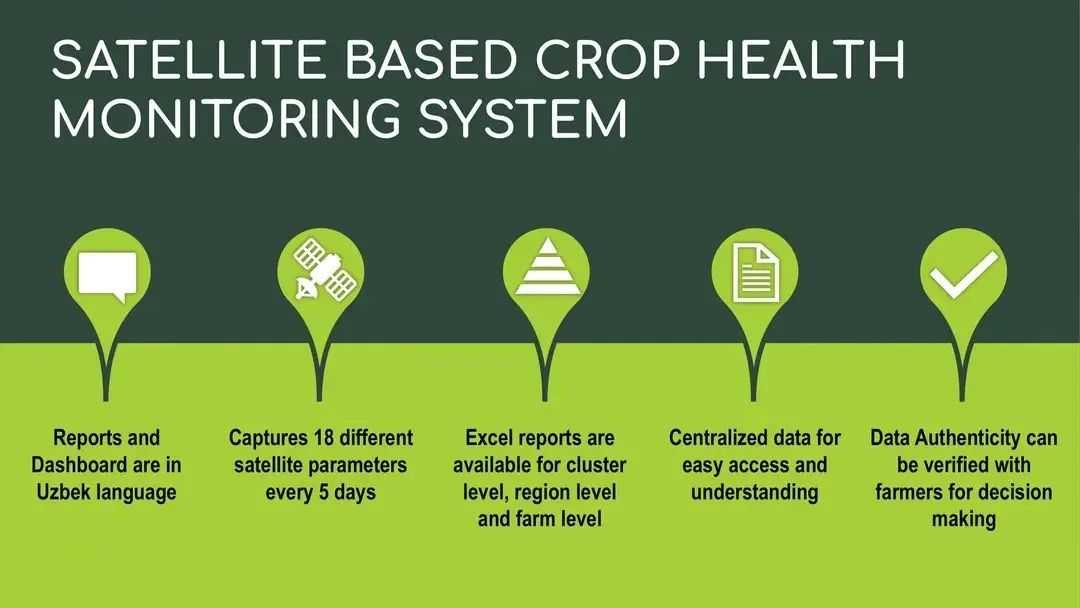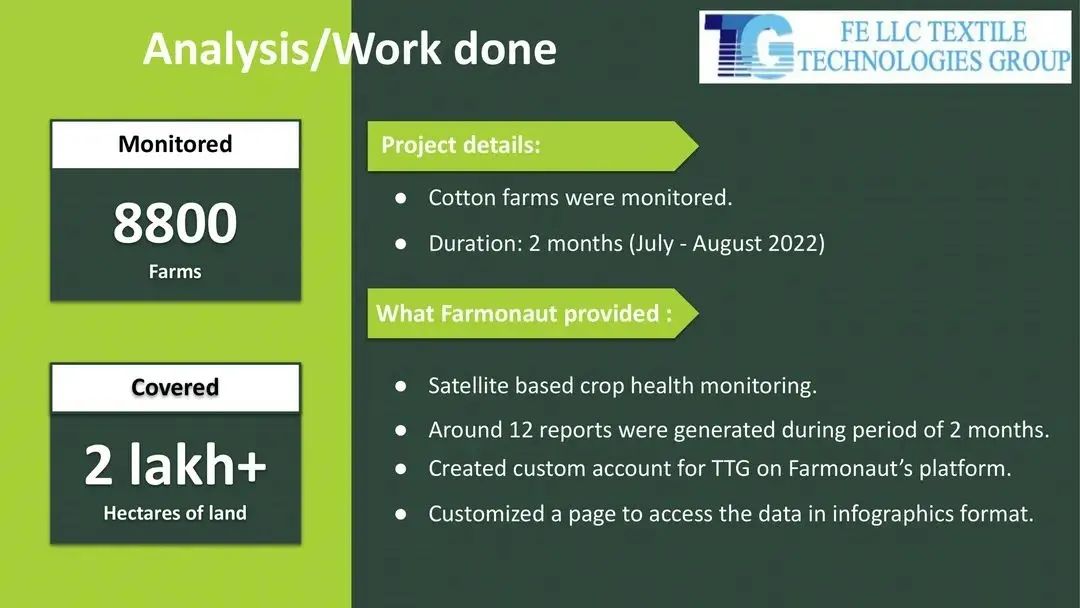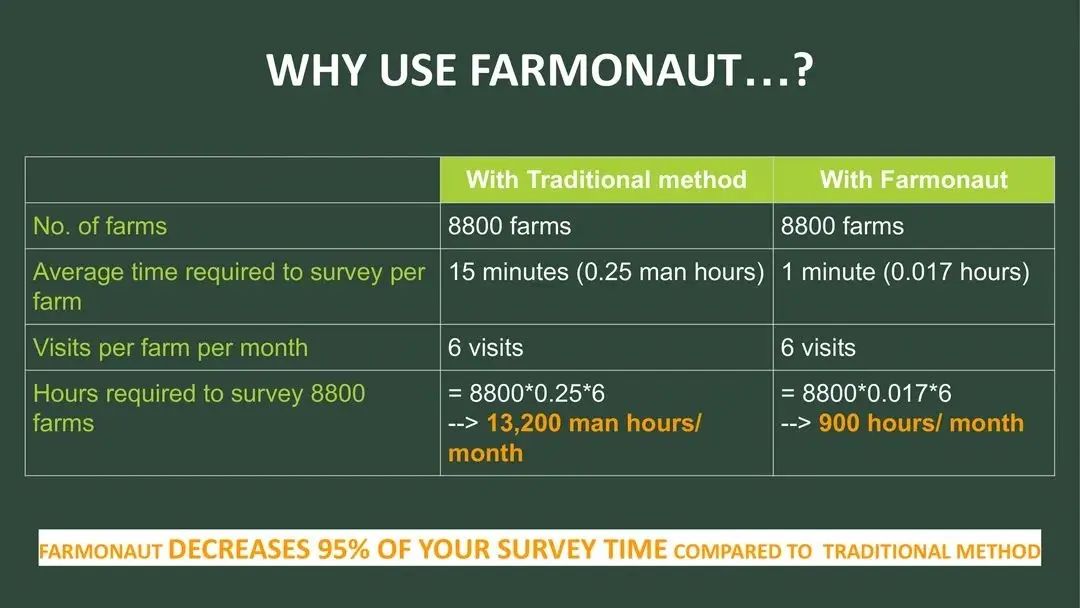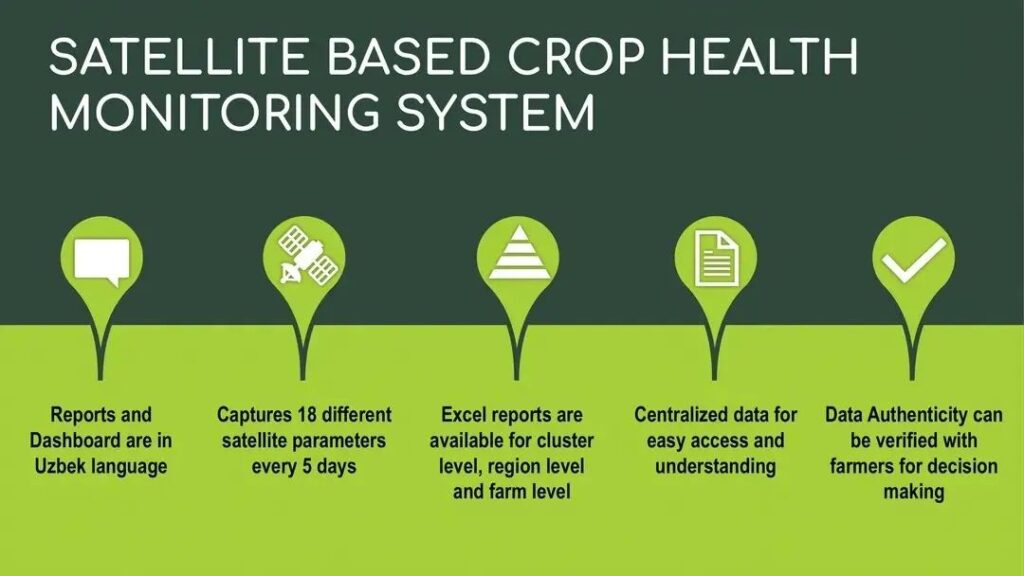Farmonaut’s Impact on Uzbekistan Cotton Farming: A Revolutionary Approach to Precision Agriculture

As we prepare for a new cotton season in Uzbekistan, let’s take a detailed look at how Farmonaut® has revolutionized cotton farming in the region. Our cutting-edge satellite-based crop health monitoring system has made significant strides in enhancing agricultural productivity and sustainability.
Unprecedented Coverage and Efficiency
This past year, Farmonaut’s highly automated satellite-based crop health monitoring system has achieved remarkable results:
- Monitored over 8,800 farms
- Covered more than 200,000 hectares of farmland
- Operated across 18 different regions in the Bo’Ka and Chinoz Clusters of Uzbekistan
Our advanced technology has dramatically reduced the time and resources required for comprehensive farm surveys. Compared to traditional methods, we’ve achieved a staggering 95% reduction in survey time. This efficiency allows for rapid identification of underperforming areas in terms of crop health and irrigation needs.

Customization for Local Needs
At Farmonaut, we understand the importance of accessibility and ease of use. To cater to our Uzbek partners, we’ve taken significant steps to enhance our services:
- Customized our satellite reporting system to be fully compatible with the Uzbek language
- Integrated farm machinery with our servers for real-time tracking of locations and activities
These adaptations ensure that local farmers and agricultural professionals can easily interpret and act upon the valuable data we provide.
The Power of Satellite-Based Monitoring
Our satellite-based crop health monitoring system offers numerous advantages over traditional methods and even other modern approaches like drone surveys or IoT sensors. Here’s a comparison to illustrate why Farmonaut’s solution stands out:
| Feature | Farmonaut Satellite System | Drone-based Monitoring | IoT Sensors |
|---|---|---|---|
| Coverage Area | Vast (200,000+ hectares) | Limited (Depends on flight time) | Very Limited (Point-based) |
| Frequency of Data Collection | Daily (Cloud permitting) | As per manual flights | Continuous but localized |
| Cost Efficiency | High | Moderate | Low (High initial investment) |
| Ease of Deployment | Immediate | Requires planning and permissions | Requires physical installation |
| Data Processing Time | Fast (Automated) | Moderate (Semi-automated) | Fast (Real-time) |
| Scalability | Highly Scalable | Moderately Scalable | Limited Scalability |
Deep Dive into Farmonaut’s Technology
Farmonaut’s success in Uzbekistan’s cotton farming sector is built upon a foundation of advanced technologies and innovative approaches to agriculture. Let’s explore the key components that make our system so effective:
1. Satellite-Based Crop Health Monitoring
Our system utilizes multispectral satellite imagery to provide comprehensive insights into crop health. This technology allows us to monitor vast areas of farmland efficiently and frequently, offering several key benefits:
- Vegetation Health Index (NDVI): We use Normalized Difference Vegetation Index (NDVI) to assess the health and vigor of cotton plants across entire fields.
- Soil Moisture Analysis: Our satellite data helps identify areas with inadequate or excessive soil moisture, crucial for optimal cotton growth.
- Early Problem Detection: By analyzing spectral signatures, we can detect issues like pest infestations, diseases, or nutrient deficiencies before they become visible to the naked eye.
This plant growth monitoring system provides farmers with actionable insights, allowing them to address issues promptly and optimize resource allocation.
2. AI-Powered Advisory System: Jeevn AI
Complementing our satellite monitoring is Jeevn AI, our artificial intelligence-driven farm advisory tool. Jeevn AI analyzes satellite data along with other crucial factors to provide personalized recommendations:
- Customized irrigation schedules based on crop requirements and local weather conditions
- Fertilizer application advice to optimize nutrient uptake and prevent over-fertilization
- Pest and disease management strategies tailored to the specific challenges faced by Uzbek cotton farmers
- Yield prediction models to help farmers and agricultural planners make informed decisions
By integrating AI with satellite data, we provide a level of precision and personalization that was previously unattainable in large-scale farming operations.
3. Blockchain-Based Traceability
In the cotton industry, traceability is becoming increasingly important. Our blockchain integration offers:
- Transparent tracking of cotton from field to fabric
- Verification of sustainable and ethical farming practices
- Enhanced trust between farmers, processors, and end consumers
This technology not only benefits farmers by potentially increasing the value of their crops but also supports Uzbekistan’s efforts to position its cotton industry as sustainable and responsible on the global stage.
4. Real-Time Fleet and Resource Management
Our system goes beyond crop monitoring to optimize the entire farming operation:
- GPS tracking of agricultural machinery for efficient deployment and utilization
- Fuel consumption monitoring to reduce waste and environmental impact
- Maintenance scheduling to prevent breakdowns during critical farming periods
This comprehensive approach ensures that all aspects of the cotton farming process are streamlined and efficient.
The Impact on Uzbekistan’s Cotton Industry

The implementation of Farmonaut’s technology in Uzbekistan’s cotton sector has led to significant improvements:
1. Increased Productivity
By providing timely and accurate information about crop health and field conditions, we’ve helped farmers optimize their practices, leading to increased yields and better quality cotton.
2. Resource Conservation
Our precise irrigation and fertilizer recommendations have resulted in more efficient use of water and chemicals, reducing environmental impact and operational costs.
3. Time and Labor Savings
The automation of field monitoring has dramatically reduced the need for manual inspections, allowing farm workers to focus on more value-added tasks.
4. Data-Driven Decision Making
With access to comprehensive, real-time data, farm managers and government officials can make more informed decisions about resource allocation, policy, and long-term planning.
Case Study: Bo’Ka and Chinoz Clusters
Our work in the Bo’Ka and Chinoz Clusters of Uzbekistan serves as a prime example of the transformative power of satellite-based agriculture technology. These regions, known for their significant contribution to Uzbekistan’s cotton production, faced challenges such as water scarcity and soil degradation.
By implementing Farmonaut’s system across 18 different regions within these clusters, we observed:
- A 20% increase in water use efficiency through optimized irrigation scheduling
- 15% reduction in fertilizer use without compromising yield, thanks to precise application recommendations
- Early detection of pest infestations in over 500 farms, preventing potential crop losses valued at millions of dollars
- 30% reduction in the time required for field inspections and decision-making processes
These results not only demonstrate the immediate benefits to farmers but also contribute to the long-term sustainability of cotton farming in Uzbekistan.
Overcoming Challenges: Satellite Imagery and Cloud Cover
One of the challenges in satellite-based monitoring is dealing with satellite imagery clouds. Cloud cover can obstruct the view of fields, potentially leading to gaps in data. At Farmonaut, we’ve developed innovative solutions to mitigate this issue:
- Multi-Satellite Approach: We utilize data from multiple satellite constellations to increase the chances of clear imagery on any given day.
- Advanced Cloud Detection Algorithms: Our AI-powered systems can differentiate between clouds and land features, ensuring accurate analysis even with partial cloud cover.
- Temporal Data Fusion: By combining data from multiple dates, we can fill in gaps caused by cloud cover, providing continuous monitoring.
- Integration with Ground-Based Data: When satellite data is unavailable, we supplement our analysis with data from weather stations and IoT sensors to maintain continuity in our monitoring and advisory services.
These strategies ensure that Uzbek cotton farmers receive consistent, reliable data regardless of weather conditions, maintaining the effectiveness of our monitoring system throughout the growing season.
The Future of Cotton Farming in Uzbekistan with Farmonaut
As we look to the future, Farmonaut is committed to continuing our support of Uzbekistan’s cotton industry. Our roadmap includes:
- Enhanced AI Capabilities: Further refinement of our AI models to provide even more accurate and personalized recommendations.
- Integration with Climate Change Models: Incorporating long-term climate predictions to help farmers adapt to changing environmental conditions.
- Expanded Blockchain Implementation: Extending our traceability solutions to cover the entire cotton supply chain, from seed to shelf.
- Collaborative Research: Partnering with local agricultural institutions to develop cotton varieties optimized for satellite-based monitoring and management.
- Farmer Education Programs: Expanding our training initiatives to ensure all farmers can fully leverage the power of our technology.
These advancements will not only benefit individual farmers but will also contribute to Uzbekistan’s position as a leader in sustainable, high-tech cotton production on the global stage.
Comparison with Traditional Methods

The efficiency gains provided by Farmonaut’s system are truly remarkable when compared to traditional farming methods:
- Traditional methods require approximately 15 minutes (0.25 man-hours) to survey a single farm.
- With Farmonaut, the same survey can be completed in just 1 minute (0.017 hours).
- For 8,800 farms with 6 visits per month, traditional methods would require 13,200 man-hours.
- Farmonaut reduces this to just 897.6 man-hours – a saving of over 12,300 hours per month!
This dramatic reduction in time and labor allows for more frequent monitoring and faster response to emerging issues, ultimately leading to better crop management and higher yields.
Farmonaut’s Role in the Broader Agricultural Technology Landscape
While our work in Uzbekistan’s cotton sector has been groundbreaking, it’s important to note that Farmonaut’s technology has wide-ranging applications across various crops and regions. As one of the leading remote sensing companies in India, we’re at the forefront of the agricultural technology revolution.
Our expertise extends beyond cotton to include:
- Cereal crops like wheat and rice
- Cash crops such as sugarcane and tea
- Fruit orchards and vineyards
- Vegetable farming
This versatility allows us to contribute to agricultural development and food security on a global scale. While we don’t specifically focus on cotton cultivation in India map services, our technology is adaptable to various geographical contexts and farming systems.
How to Get Started with Farmonaut
For farmers, agribusinesses, or government agencies interested in leveraging Farmonaut’s technology, we offer several ways to access our services:
- Mobile Apps: Download our user-friendly apps for instant access to farm monitoring tools:
- Web Platform: Access our comprehensive web-based dashboard for in-depth analysis and management tools at Farmonaut Web Platform.
- API Integration: For developers and businesses looking to integrate our data into their own systems, we offer robust API solutions. Learn more at our API Documentation.
Subscription Plans
To cater to the diverse needs of our clients, we offer flexible subscription plans. Choose the option that best suits your requirements:
Frequently Asked Questions (FAQ)
Q: How often is satellite data updated in Farmonaut’s system?
A: Our system typically provides daily updates, cloud cover permitting. In cases of persistent cloud cover, we use advanced algorithms and multiple data sources to ensure continuous monitoring.
Q: Can Farmonaut’s technology be used for crops other than cotton?
A: Absolutely! While our work in Uzbekistan focuses on cotton, our technology is adaptable to a wide range of crops, including cereals, fruits, vegetables, and other cash crops.
Q: How does Farmonaut ensure the accuracy of its crop health assessments?
A: We use a combination of high-resolution multispectral satellite imagery, advanced AI algorithms, and ground-truthing data to ensure the highest possible accuracy in our assessments.
Q: Is Farmonaut’s system suitable for small-scale farmers?
A: Yes, our system is designed to be scalable and accessible to farmers of all sizes. We offer various plans to suit different needs and farm sizes.
Q: How does Farmonaut’s technology contribute to sustainable farming practices?
A: By optimizing resource use (water, fertilizers, pesticides) and providing early detection of crop issues, our technology helps reduce environmental impact while improving yield and quality.
Q: Can Farmonaut’s data be integrated with other farm management software?
A: Yes, we offer API access that allows for seamless integration with other farm management tools and software systems.
Conclusion
As we reflect on the impressive results achieved in Uzbekistan’s cotton farming sector, it’s clear that Farmonaut’s satellite-based crop health monitoring system represents a significant leap forward in agricultural technology. By dramatically reducing survey times, providing real-time insights, and offering customized solutions, we’re not just improving efficiency – we’re revolutionizing the way cotton is farmed.
The success in Uzbekistan serves as a powerful testament to the potential of precision agriculture when powered by advanced satellite technology and artificial intelligence. As we continue to refine our systems and expand our services, we remain committed to our mission of making precision agriculture accessible and affordable to farmers worldwide.
The future of farming is here, and it’s powered by satellites, AI, and the innovative spirit of companies like Farmonaut. Together, we’re cultivating a more sustainable, productive, and technologically advanced agricultural sector – not just in Uzbekistan, but across the globe.
For more information on how Farmonaut can transform your farming operations, visit our website or contact our team of agricultural technology experts. Let’s grow the future of farming together!
